九年级英语上册第二单元重要知识点总结
- 格式:pdf
- 大小:433.35 KB
- 文档页数:15
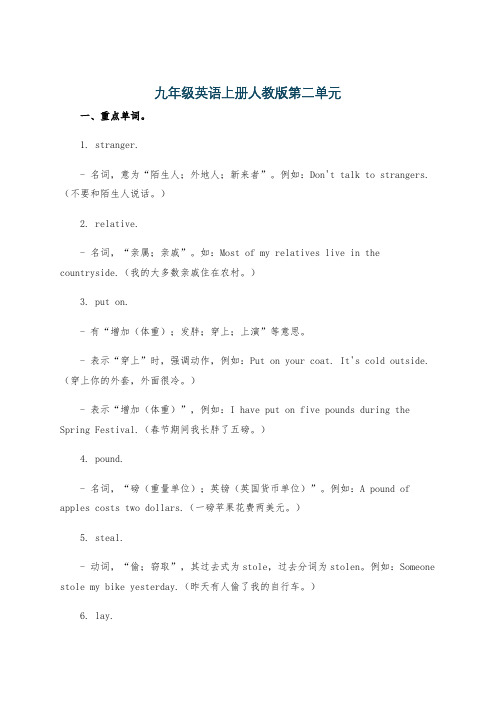
九年级英语上册人教版第二单元一、重点单词。
1. stranger.- 名词,意为“陌生人;外地人;新来者”。
例如:Don't talk to strangers.(不要和陌生人说话。
)2. relative.- 名词,“亲属;亲戚”。
如:Most of my relatives live in the countryside.(我的大多数亲戚住在农村。
)3. put on.- 有“增加(体重);发胖;穿上;上演”等意思。
- 表示“穿上”时,强调动作,例如:Put on your coat. It's cold outside.(穿上你的外套,外面很冷。
)- 表示“增加(体重)”,例如:I have put on five pounds during the Spring Festival.(春节期间我长胖了五磅。
)4. pound.- 名词,“磅(重量单位);英镑(英国货币单位)”。
例如:A pound of apples costs two dollars.(一磅苹果花费两美元。
)5. steal.- 动词,“偷;窃取”,其过去式为stole,过去分词为stolen。
例如:Someone stole my bike yesterday.(昨天有人偷了我的自行车。
)6. lay.- 动词,“放置;安放;产(卵);下(蛋)”,其过去式为laid,过去分词为laid。
例如:The hen lays an egg every day.(这只母鸡每天下一个蛋。
)- 区别于lie(躺;位于),lie的过去式为lay,过去分词为lain。
7. dessert.- 名词,“(饭后)甜点;甜食”。
例如:Ice - cream is my favorite dessert.(冰淇淋是我最喜欢的甜点。
)8. garden.- 名词,“花园;园子”。
例如:There are many beautiful flowers in the garden.(花园里有许多美丽的花朵。
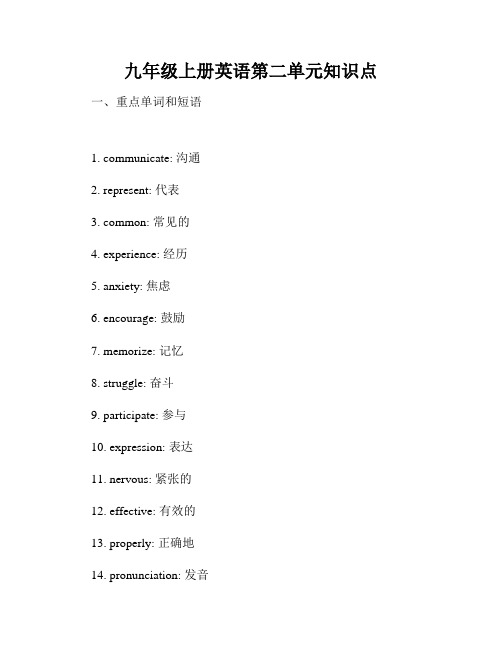
九年级上册英语第二单元知识点一、重点单词和短语1. communicate: 沟通2. represent: 代表3. common: 常见的4. experience: 经历5. anxiety: 焦虑6. encourage: 鼓励7. memorize: 记忆8. struggle: 奋斗9. participate: 参与10. expression: 表达11. nervous: 紧张的12. effective: 有效的13. properly: 正确地14. pronunciation: 发音15. progress: 进步二、重点语法1. 一般现在时:表示经常性、习惯性的动作或事实。
例如:She always gets up early.2. 现在进行时:表示现在进行的动作。
例如:They are playing basketball now.3. 一般过去时:表示过去发生的动作或状态。
例如:I saw a movie yesterday.4. 过去进行时:表示过去某一时刻正在进行的动作。
例如:She was studying when I called her.5. 一般将来时:表示将来要发生的动作或事件。
例如:We will visit Beijing next month.三、重点句型1. How do you communicate with your friends?你是如何与你的朋友沟通的?2. I usually talk to them on social media.我通常在社交媒体上与他们交谈。
3. English is important for communication.英语对于沟通来说很重要。
4. I have some experience in learning English.我在学习英语方面有一些经验。
5. Don't be nervous and just enjoy the process.不要紧张,尽情享受这个过程。
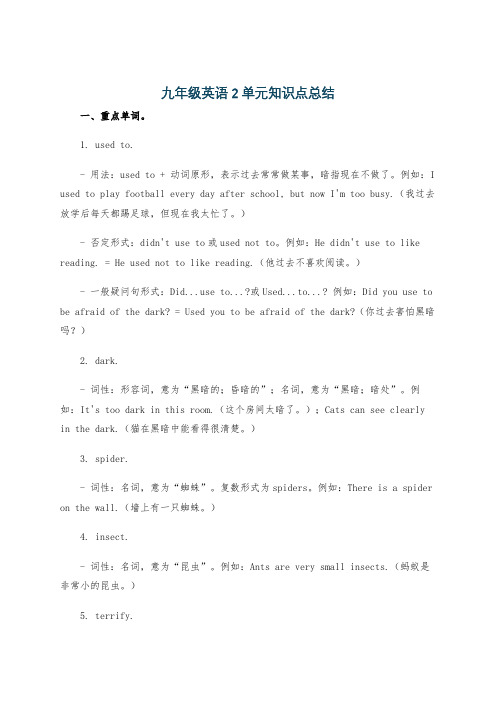
九年级英语2单元知识点总结一、重点单词。
1. used to.- 用法:used to + 动词原形,表示过去常常做某事,暗指现在不做了。
例如:I used to play football every day after school, but now I'm too busy.(我过去放学后每天都踢足球,但现在我太忙了。
)- 否定形式:didn't use to或used not to。
例如:He didn't use to like reading. = He used not to like reading.(他过去不喜欢阅读。
)- 一般疑问句形式:e to...?或Used...to...? 例如:Did you use to be afraid of the dark? = Used you to be afraid of the dark?(你过去害怕黑暗吗?)2. dark.- 词性:形容词,意为“黑暗的;昏暗的”;名词,意为“黑暗;暗处”。
例如:It's too dark in this room.(这个房间太暗了。
);Cats can see clearlyin the dark.(猫在黑暗中能看得很清楚。
)3. spider.- 词性:名词,意为“蜘蛛”。
复数形式为spiders。
例如:There is a spider on the wall.(墙上有一只蜘蛛。
)4. insect.- 词性:名词,意为“昆虫”。
例如:Ants are very small insects.(蚂蚁是非常小的昆虫。
)5. terrify.- 词性:动词,意为“使害怕;使恐惧”。
常见搭配:terrify sb.例如:The loud noise terrified the baby.(巨大的噪音吓坏了婴儿。
)- 形容词形式:terrified(感到害怕的,用来形容人)和terrifying(令人害怕的,用来形容事物)。

九年级上册英语第二单元笔记一、单元概述本单元主要讲述了语法知识,包括名词的数、所有格、可数与不可数、时态等。
同时,还涉及到一些重要的句型和词汇,如现在进行时、过去进行时、一般过去时等。
本单元旨在帮助学生掌握这些语法知识,提高英语表达能力。
二、重点知识点1.名词的数:名词是英语中非常重要的语法概念,包括可数名词和不可数名词。
名词的数是指名词的复数形式和单数形式。
在学习过程中,学生需要掌握名词的正确形式,以便正确表达句意。
2.名词所有格:名词所有格表示某物属于某人或某物所有。
在学习过程中,学生需要掌握如何正确使用名词所有格,包括在什么情况下使用’s,以及如何处理无生命的名词所有格。
3.时态:本单元涉及到的时态包括现在进行时、过去进行时和一般过去时。
这些时态是英语语法中的重要组成部分,用于描述动作发生的时间和状态。
学生需要掌握这些时态的基本用法和形式,以便正确表达句意。
三、重要句型和词汇1.现在进行时:基本结构为be+doing,用于描述正在发生的事情。
常用句型有what/which/whoisdoing,where/whenishe/she/itdoing等。
学生需要掌握现在进行时的用法和表达方式,以便正确使用。
2.过去进行时:基本结构为was/were+doing,用于描述过去发生的事情。
常用句型有what/which/whowas/weredoingatthattime等。
学生需要掌握过去进行时的用法和表达方式,以便在写作中正确使用。
3.一般过去时:基本结构为was/were+done或did+原形,用于描述过去发生的事情。
常用句型有what/which/whodid等。
学生需要掌握一般过去时的用法和表达方式,以便在口语和写作中正确使用。
4.词汇:本单元涉及到的词汇包括名词、动词、形容词等。
学生需要掌握这些词汇的拼写和用法,以便正确表达句意。
四、笔记总结本单元主要讲述了名词的数、所有格、时态等语法知识,以及一些重要的句型和词汇。

九年级上册英语第二单元知识点梳理1. 词汇本单元主要涉及以下词汇:- appliance - 家用电器- behavior - 行为- daily routine - 日常事务- electronic device - 电子设备- etiquette - 礼仪- household chores - 家务事- manage - 管理- responsibility - 责任- schedule - 日程安排- task - 任务2. 语法本单元涉及以下语法知识:- 现在进行时:用于描述正在进行的动作或状态。
- 句型结构:主语 + am/is/are + 动词 + -ing。
例如:- I am watching a movie now.- She is studying for the test.- They are playing football in the park.3. 口语表达在本单元中,我们研究了一些日常生活中的口语表达。
- How do you manage your time? - 你是如何管理时间的?- What are your daily responsibilities? - 你的日常责任是什么?- Can you help me with this task? - 你能帮我做这个任务吗?- I need to do my household chores. - 我需要做家务事。
- It's important to have good etiquette. - 有良好的礼仪很重要。
4. 情景对话本单元涉及以下情景对话:1. 在朋友家拜访的对话2. 家庭成员分担家务的对话3. 大家分享日常事务的对话4. 讨论日程安排的对话通过这些情景对话,我们可以研究如何运用所学的语言知识来进行实际交流。
以上是九年级上册英语第二单元的知识点梳理。
希望对你的学习有所帮助!。
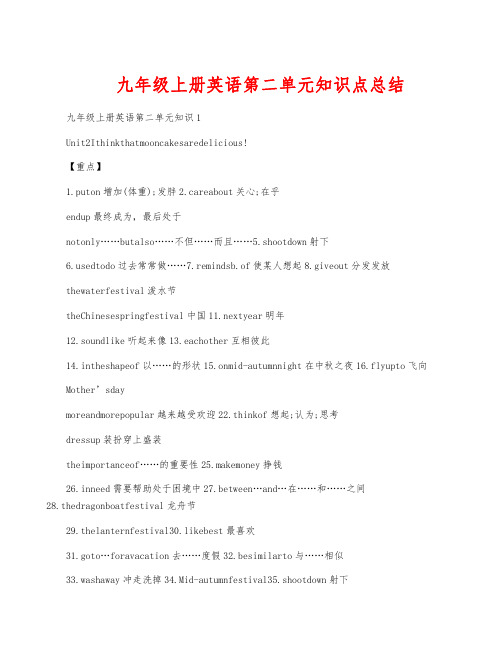
九年级上册英语第二单元知识点总结九年级上册英语第二单元知识1Unit2Ithinkthatmooncakesaredelicious!【重点】1.puton增加(体重);发胖2.careabout关心;在乎endup最终成为,最后处于notonly……butalso……不但……而且……5.shootdown射下edtodo过去常常做……7.remindsb.of使某人想起8.giveout分发发放thewaterfestival泼水节theChinesespringfestival中国11.nextyear明年12.soundlike听起来像13.eachother互相彼此14.intheshapeof以……的形状15.onmid-autumnnight在中秋之夜16.flyupto飞向Mother’sdaymoreandmorepopular越来越受欢迎22.thinkof想起;认为;思考dressup装扮穿上盛装theimportanceof……的重要性25.makemoney挣钱26.inneed需要帮助处于困境中27.between…and…在……和……之间28.thedragonboatfestival龙舟节29.thelanternfestival30.likebest最喜欢31.goto…foravacation去……度假32.besimilarto与……相似33.washaway冲走洗掉34.Mid-autumnfestival35.shootdown射下callout大声呼喊thetraditionof……的传统38.atnight在夜里;在晚上one…,theother…一个……,另一个…...Father’sday【重点句型】Ithinkthatthey’refuntowatch.我认为它们看着很有意思。
Whatdoyoulikeabout…?WhatdoyoulikebestabouttheDragonBoatFestival?关于,你最喜欢什么?Whatagreatday!多么美好的一天!4.1wonderif…Iwonderifit’ssimilartotheWaterFestivaloftheDaipeopleinYunnanProvince.我想知道它是否与云南傣族的泼水节相似。
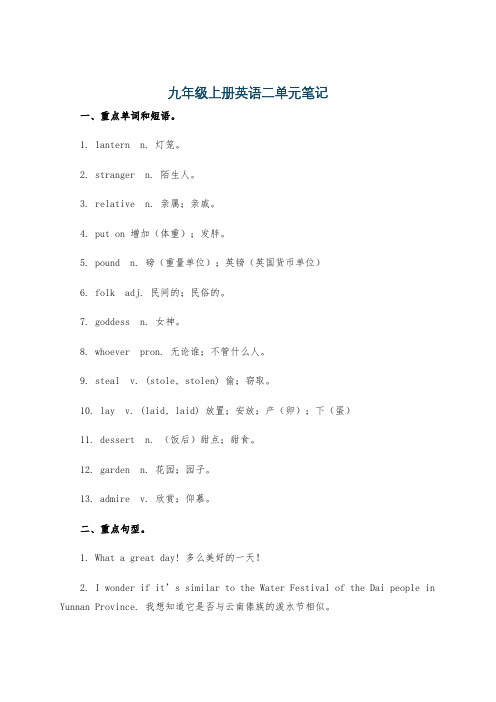
九年级上册英语二单元笔记一、重点单词和短语。
1. lantern n. 灯笼。
2. stranger n. 陌生人。
3. relative n. 亲属;亲戚。
4. put on 增加(体重);发胖。
5. pound n. 磅(重量单位);英镑(英国货币单位)6. folk adj. 民间的;民俗的。
7. goddess n. 女神。
8. whoever pron. 无论谁;不管什么人。
9. steal v. (stole, stolen) 偷;窃取。
10. lay v. (laid, laid) 放置;安放;产(卵);下(蛋)11. dessert n. (饭后)甜点;甜食。
12. garden n. 花园;园子。
13. admire v. 欣赏;仰慕。
二、重点句型。
1. What a great day! 多么美好的一天!2. I wonder if it’s similar to the Water Festival of the Dai people in Yunnan Province. 我想知道它是否与云南傣族的泼水节相似。
3. People go on the streets to throw water at each other. 人们走上街头互相泼水。
4. The new year is a time for cleaning and washing away bad things. 新年是清扫和洗掉不好的东西的时候。
5. Then you’ll have good luck in the new year. 然后在新的一年里你将会有好运。
三、语法点。
1. 宾语从句。
- 宾语从句在句中作宾语,一般位于及物动词或介词之后。
- 宾语从句的语序要用陈述句语序,即“连接词 + 主语 + 谓语 + 其他”。
- 常见的连接词有:that(在口语或非正式文体中常省略)、if / whether(是否)、特殊疑问词(what, who, where, when, why, how 等)2. 感叹句。

人教版九年级英语上册Unit2重要知识点详解1.XXX1) AdjectivesXXX: XXX.XXX: This is an XXX.Dead: XXX.XXX: His grandma has been dead for three years.XXX: XXX.XXX: According to the old people。
this is a XXX.2) NounsXXX: XXX-XXX Festival.XXX: XXX 15.XXX: a portable light source used to XXX.XXX: On the night of New Year's Eve。
red XXX.Stranger: a person whom one does not know or with whom one is not familiar.XXX: Don't open the door to strangers.Relative: a XXX.XXX: His XXX.Goddess: a XXX.XXX: Chang'e is a goddess in the Moon Palace.Dessert: a sweet course served at the end of a meal.XXX: Children like to have XXX.XXX: a piece of ground where flowers。
vegetables。
or fruit are grown.XXX: There are all kinds of XXX.XXX: a long。
narrow piece of cloth worn around the neck.XXX: XXX.Ghost: an n of a dead person.XXX: This is a story about ghosts.XXX: a XXX.XXX: Boys like to play tricks.Treat: an event or item that is out of the ordinary and gives great pleasure.XXX: We were treated to a XXX XXX.二、【重点句型】1.It's said that。

九年级英语上册第二单元知识点Unit 2 I think that mooncakes are delicious!一.短语归纳1.the Lantern Festival元宵节2.the Dragon Boat Festival端午节3.the Water Festival泼水节4.be fun to watch看着很有意思5.eat five meals a day一天吃五餐6.put on five pounds体重增加了五磅7.in two weeks两星期之后8.be similar to...与.......相似17.end up最终成为;最后处于18.share sth.with sb.与……分享……19.as a result结果20.dress up乔装打扮21.haunted house鬼屋22.call out大声呼喊23.remind sb.of使某人想起24.sound like听起来像25.treat sb.with.用/以……对待某人26.the beginning of new life新生命的开始二.用法集萃1.感叹句式一:What+(a/an)+adj+名词(+主语+谓语+其他)!多么……的……感叹句式二:How+adj/adv+主语+谓语+其他!……多么……!2.in+时间段在……后3.give sb.sth.给某人某物4.plan to do sth计划做某事5.refuse to do sth拒绝做某事6.one of+名词复数形式……之一7.it+is+名词+动词不定式(to do sth)做某事是…8.what…think of…?认为…怎么样?9.make sb do sth让某人做某事ed to be过去是……11.warn sb(not)to do sth告诫某人做某事12.tell sb(not)to do sth告诉某人做某事13.decide to do sth决定做某事14.promise to do sth承诺、答应做某事三.语法全解.1.宾语从句一.连词a.陈述语序(that)b.一般疑问句(if或whether)c.特殊疑问句(5w,1h)二.陈述语序三.时态可跟that从句做宾语的动词:say,think,insist,wish,hope,demand,imagine,wonder,know,see,believe,agr ee,admit,deny,expect,explain,order,command,feel,dream,suggest,hear,me an,notice,prefer,request,require,propose,declare,report等例:I don't know what they are looking for.Could you tell me when the train will leave?注意:当主句谓语动词是think,believe,suppose,expect等词,而宾语从句的意思是否定时,常把否定转移至主句表示。
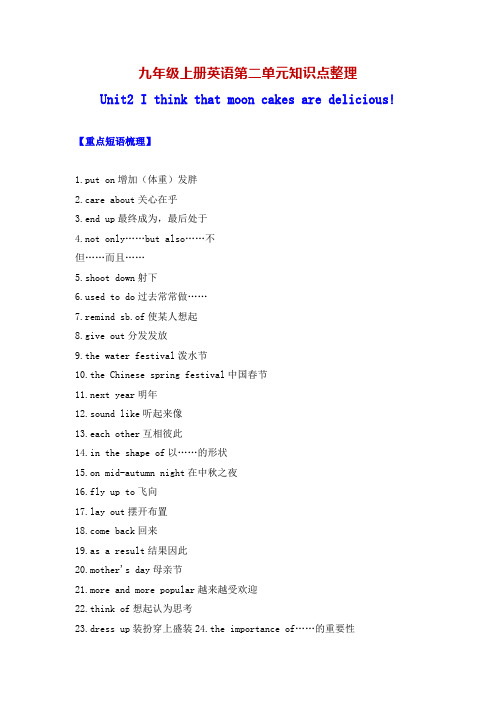
九年级上册英语第二单元知识点整理Unit2 I think that moon cakes are delicious!【重点短语梳理】1.put on增加(体重)发胖2.care about关心在乎3.end up最终成为,最后处于4.not only……but also……不但……而且……5.shoot down射下ed to do过去常常做……7.remind sb.of使某人想起8.give out分发发放9.the water festival泼水节10.the Chinese spring festival中国春节11.next year明年12.sound like听起来像13.each other互相彼此14.in the shape of以……的形状15.on mid-autumn night在中秋之夜16.fly up to飞向y out摆开布置e back回来19.as a result结果因此20.mother's day母亲节21.more and more popular越来越受欢迎22.think of想起认为思考23.dress up装扮穿上盛装24.the importance of……的重要性25.make money挣钱26.in need需要帮助处于困境中27.between……and……在……和……之间28.the dragon boat festival龙舟节29.the lantern festival元宵节30.like best最喜欢31.go to……for a vacation去……度假32.be similar to与……相似33.wash away冲走洗掉34.mid-autumn festival中秋节35.shoot down射下36.call out大声呼喊37.the tradition of……的传统38.at night在夜里在晚上39.one……,the other……一个……,另一个…40.Father‘s day父亲节41.have to必须不得不42.play a trick on sb捉弄某人43.the spirit of……的精神44.care about关心45.wake up醒来46.the beginning of……的开始【重要考点】1.What+a(n)+形容词+可数名词的单数形式+主语+谓语+其他)!多么……的……!2.How+形容词/副词(+主语+谓语+其他)!……多么……!3.be going to将要/打算……4.in+时间段在……后5.give sb.sth.=give sth.to sb.给某人某物;把某物给某人6.plan to do sth.计划做某事7.refuse to do sth.拒绝做某事8.one of+名词复数形式……之一【重点语法】一.宾语从句宾语从句在复合句中作主句的宾语。
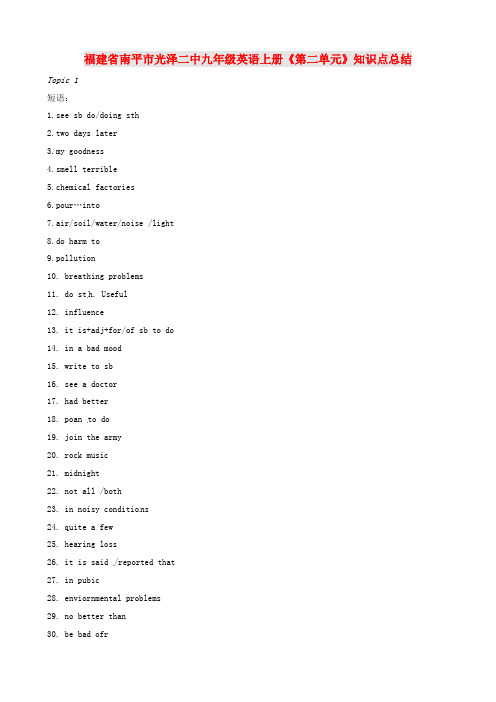
福建省南平市光泽二中九年级英语上册《第二单元》知识点总结Topic 1短语:1.see sb do/doing sth2.two days later3.my goodness4.smell terrible5.chemical factories6.pour…into7.air/soil/water/noise /light8.do harm to9.pollution10.breathing problems11.do st h. Useful12.influence13.it is+adj+for/of sb to do14.in a bad mood15.write to sb16.see a doctor17.had better18.poan to do19.join the army20.rock music21.midnight22.not all /both23.in noisy conditio ns24.quite a few25.hearing loss26.it is said /reported that27.in pubic28.enviornmental problems29.no better than30.be bad ofr31.with the increase of population32.put…into33.high blood pressure34.in strong light35.greener people36.manage to do二、语法要点:此刻完成时与for或since连历时动词要用延续动词,若是是非延续动词能够用下面的方法来解决:1、用have/has been +adj/adv/prepHe died three years ago.He has been dead ofr three years/since three years ago.The door was opened two hours ago.The door has been open for tow hours /since two hours ago.He left the room yesterday.He has been away for one day/since yesterday.He came to /arrived at /reached /got to Xinhe Middle School t hree years ago.He has been in Xinhe Middle Shool for three years/since three years ago.He joined the army 3 years ago.He has been in the army for 3 years/since 3 years ago.二、找一个意思相近的延续动词来表达。
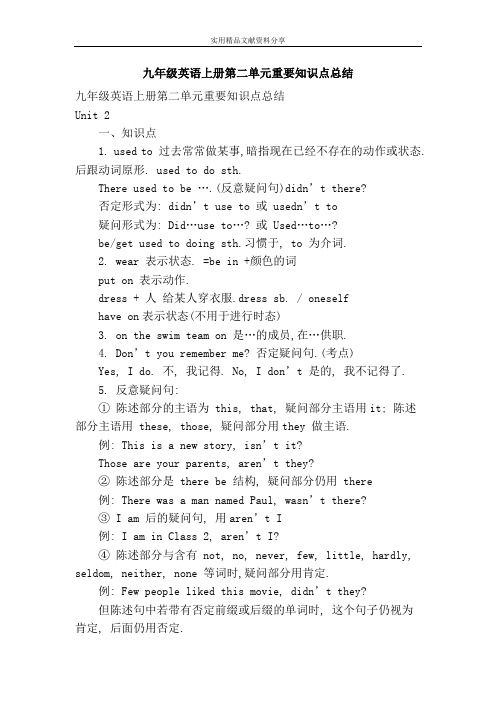
九年级英语上册第二单元重要知识点总结九年级英语上册第二单元重要知识点总结Unit 2一、知识点1. used to 过去常常做某事,暗指现在已经不存在的动作或状态. 后跟动词原形. used to do sth.There used to be ….(反意疑问句)didn’t there?否定形式为: didn’t use to 或usedn’t to疑问形式为: Did…use to…? 或Used…to…?be/get used to doing sth.习惯于, to 为介词.2. wear 表示状态. =be in +颜色的词put on 表示动作.dress + 人给某人穿衣服.dress sb. / oneselfhave on表示状态(不用于进行时态)3. on the swim team on 是…的成员,在…供职.4. Don’t you remember me? 否定疑问句.(考点)Yes, I do. 不, 我记得. No, I don’t 是的, 我不记得了.5. 反意疑问句:① 陈述部分的主语为 this, that, 疑问部分主语用it; 陈述部分主语用 these, those, 疑问部分用they 做主语.例: This is a new story, isn’t it?Those are your parents, aren’t they?② 陈述部分是 there be 结构, 疑问部分仍用 there例: There was a man named Paul, wasn’t there?③ I am 后的疑问句, 用aren’t I例: I am in Class 2, aren’t I?④ 陈述部分与含有 not, no, never, few, little, hardly, seldom, neither, none 等词时,疑问部分用肯定.例: Few people liked this movie, didn’t they?但陈述句中若带有否定前缀或后缀的单词时, 这个句子仍视为肯定, 后面仍用否定.例: Your sister is unhappy, isn’t she?⑤ 陈述部分的主语若为不定式或 V-ing 短语, 疑问部分主语用it.例: To spend so much money on clothes is unnecessary, isn’t it?⑥ 陈述句中主语是 nobody, no one, everyone, everybody 等指人的不定代词时,疑问部分用they做主语; 若陈述部分主语是something, anything, noting, everything 等指事物的不定代词时, 疑问部分用it 做主语.例: Nobody says one word about the accident, do they?Everything seems perfect, doesn’t it?⑦ 当主语是第一人称I时, 若谓动为think, believe, guess 等词时, 且其后跟宾丛,这时疑问句部分的人称, 时态要与宾语从句保持一致, 同时还要考虑否定转移.例: I don’t think he can finish th e work in time, can he?⑧ 前面是祈使句, 后用will you? (let’s 开头时, 后用shall we?)6. be terrified of 害怕的程度比 be afraid of 深.7. miss: ① 思念, 想念例: I really miss the old days.② 错过, 未中, 未赶上, 未找到.例: It’s a pity that you miss the bus.The boy shot at the goal, but missed.8. no more (用在句中)=not…any more (用在句尾) 指次数;no longer (用在句中)=not…any longer (用在句尾) 指时间.9. right: ① adj. 正确的, 右边的② n. 右方, 权利③ adv. 直接地.10. It seems that Yu Mei has changed a lot. = Yu Mei seems to have changed a lot.11. afford + n. /pron. afford + to do 常与can, be able to 连用.例: Can you afford a new car?The film couldn’t afford to pay such large salaries.12. as well as 连词, 不但…而且… 强调前者. (若引导主语, 谓动与前者在人称和数上一致例: Living things need air and light as well as water.生命不仅需要水, 还需要空气和阳光.I as well as they am ready to help you.不仅是他们, 我也愿意帮助你.13. alone = by oneself 独自一人. lonely 孤独的, 寂寞的.14. in the last/past + 一段时间during the last/past + 一段时间与现在完成时连用.15. die (v.) dead (adj.) death (n.) dying (垂死的)16. play the piano 弹钢琴17. ①be/ become interested in sth. 对…感兴趣②be interested in doing sth. 对做…感兴趣③show great interest in 在……方面产生极大的兴趣④a place of interest 一处名胜 some places of interest如:He is interested in math, but he isn’t interested in speakingEnglish. 他对数学感兴趣,但是他对说英语不感兴趣。

九年级上册英语unit2知识点人教版九年级上册英语Unit 2知识点九年级上册英语Unit 2是一个重要的学习单元,它涵盖了很多基本的英语知识点,帮助学生在英语学习中建立坚实的基础。
本文将围绕Unit 2的知识点进行讲解,帮助大家更好地理解和掌握。
主题1: 常见的英语固定搭配Unit 2中包含了许多常见的英语固定搭配,如"make a speech","take a chance"等。
这些固定搭配在英语中使用非常普遍,掌握它们对于学生的口语表达和写作能力有极大的帮助。
主题2: 介词的用法介词是英语中一个重要的语法点,它用来表示人、物、地点、时间等之间的关系。
在Unit 2中,学生需要掌握一些常见介词的用法,如"in","on","at"等。
同时,介词的用法也需要注意一些固定搭配,如"at the end of","in the middle of"等。
主题3: 定语从句的构成和用法定语从句在英语中起到修饰名词的作用,使句子更加精确和具体。
在Unit 2中,学生需要学会如何构成定语从句,并且掌握一些常见的关系代词和关系副词的用法,如"which","where","when"等。
主题4: 情态动词的用法情态动词是英语中非常常见的一种动词形式,它用来表示说话人对行为、态度和能力的判断和推测。
在Unit 2中,学生需要学会如何正确使用情态动词,如"can","could","should"等。
同时,情态动词的否定形式和疑问形式也需要掌握。
主题5: 名词的单复数形式名词的单复数形式是英语中一个基本的语法点,但是在实际应用中常常会出现错误。
在Unit 2中,学生需要学会名词的单复数形式以及一些不规则名词的变化规律。

人教版九年级英语上册Unit2重要知识点详解+练习一、【重点词汇】1. 重点单词(1)形容词folk民间的;民俗的This is an interesting folktale.这是一个有趣的民间传说。
dead死的;失去生命的His grandma has been dead for three years. 他的祖母已经去世三年了。
hunted有鬼魂出没的;闹鬼的According to the old people, this is a haunted place for ghosts. 据老人说,这是鬼魂出没的地方。
(2)名词mooncake月饼People are eating moon cakes and enjoying the moon on August 15.人们在八月十五吃月饼、赏月。
lantern灯笼On the night of new year's Eve, red lanterns are hung everywhere in the street.stranger陌生人Don't open the door to strangers.relative亲属;亲戚His relatives came to see her yesterday.goddess女神Chang'e is a goddess in the Moon Palace.嫦娥是月宫里的女神。
dessert (饭后)甜点;甜食Children like to have sweets after meals.孩子们饭后喜欢吃甜食。
garden花园;园子There are all kinds of flowers in the garden.花园里有各种各样的花。
tie领带I bought dad a beautiful tie as a birthday present.我给爸爸买了一条漂亮的领带作为生日礼物。

Unit2 I think that mooncakes are delicious!第一课时(P9--10)一、常用短语1、Spring festival 春节2、the Lantern Festival 元宵节3、the Dragon Boat Festival 端午节4、the Water Festival 泼水节5、April Fool’s day 愚人节6、Tree Planting Day7、May Day 五一劳动节8、Women’s Day 妇女节9. be fun to watch 看着很有意思have fun doing干什么有趣have problems/trouble/difficulty in doing干什么困难have a hard/difficult time in doin g 干什么艰难10. eat five meals a day 一天吃五餐11. put on five pounds 体重增加了五磅lose weight 减肥12. in two weeks 两星期之后(用how soon 提问)13. be similar to... 与.......相似the same as 和…一样be different from与..不同14.good luck 好运气adj lucky adv luckily15.throw water at each other 互相泼水16、go to… for vacation 去、、、度假二、重点句式1、What a great day it is != How great a day it is!感叹句式一:What+(a/an)+adj+可数名词单数名词(+主语+谓语+其他)!= How +adj+ (a/an) +可数名词单数+主语+谓语+其他!多么……!感叹句式二:What +adj +可数名词复数(+主语+谓语)!多么……!What interesting books (they are !)= How interesting the books are!感叹句式三::What +adj +可数名词复数(+主语+谓语)!= How + adj +主语+谓语!What fine weather it is! = How fine the weather is!感叹句式四:How + adv +主语+谓语!How carefully he studies!感叹句式五:How +主语+谓语!How time flies!2.W hat do you like best about the Dragon Boat Festival关于龙舟节你最喜欢什么?—I love the races .I think that they’re fun to watch3. He wonders/ wants to know whether/if they’ll have zongzi next year.他想知道明年他们将吃粽子。

九年级上册英语unit2知识点梳理英语作为一门外语,对于九年级学生来说,是一个全新的挑战和学习任务。
而Unit2是九年级上册英语中的一个重要单元,它涉及了很多基础知识点。
下面就让我们来对Unit2的知识点进行一个梳理。
1. 单词学习:Unit2的单词学习是我们学习英语的基础,下面列出了本单元中常见的一些单词及其意思:- strict 严格的- geography 地理- environment 环境- pollution 污染- recycle 回收利用- factory 工厂- energy 能源- wildlife 野生生物- waste 废物- global 全球的通过积累和记忆这些单词,可以帮助我们更好地理解文章的意思。
2. 语法知识:Unit2中的语法知识点主要有动词的时态和被动语态。
动词的时态:英语中的动词有过去时、现在时和将来时。
比如,过去时用于表示过去发生的事情,现在时用于表示现在正在进行的事情,将来时用于表示将来要发生的事情。
被动语态:被动语态用于强调动作的接受者而不是动作的执行者。
例如,“The book was written by me.”这个句子中,“was written”就是被动语态。
掌握了这些语法知识,我们就能更好地理解和运用英语语言。
3. 阅读理解:Unit2中涉及到了一篇关于环境保护的文章,通过阅读理解这篇文章,我们能够更好地了解环境保护的重要性。
在阅读理解中,我们需要注意文章的主旨、段落之间的逻辑关系以及作者的态度和意图等。
同时,我们还可以通过理解文章中的词语和句子结构来推断文章的含义。
4. 写作技巧:Unit2中的写作部分要求我们写一篇关于环境保护的短文。
在写作过程中,我们需要明确文章的结构,包括开头、中间段落和结尾。
开头部分可以用一个引人注目的事实或者问题来引起读者的兴趣;中间段落可以围绕主题展开论述,列出几个关键点,并且用具体的例子来支持观点;结尾部分可以总结全文,提出行动建议或者展望未来。

九年级英语上册unit2知识点九年级英语上册Unit 2 知识点九年级英语上册的Unit 2主要涵盖了一些关于日常生活的重要知识点,让我们一起深入了解一下吧!一、名词的复数形式在英语中,名词的复数形式并不是简单地在词尾加-s。
有些名词需要将词尾的字母进行变化。
例如:man(单数)→men(复数)、woman→women、child→children等。
此外,还有一些特殊情况,如:mouse→mice、tooth→teeth以及foot→feet等。
二、定冠词与不定冠词的用法定冠词“the”用于特指已经被提及或者明确了的事物,而不定冠词“a”或“an”则用于泛指。
例如:I have a dog.(我有一只狗)在这个句子中,我们并不知道具体指的是哪一条狗,因此使用了不定冠词“a”。
三、物主代词的用法在英语中,物主代词用于指代物品的所有者,有时也可以指代人。
常见的物主代词有:my(我的)、your(你的)、his(他的)、her(她的)以及their(他们的)。
例如:This is my book.(这是我的书)在这个句子中,使用了物主代词“my”来指代“我”。
四、基数词与序数词的用法基数词表示具体的数量,如:one(一)、two(二)、three (三)等;而序数词则表示顺序,如:first(第一)、second(第二)、third(第三)等。
例如:He is the third person in line.(他是队伍中的第三个人)在这个句子中,“third”表示顺序。
五、动词的时态及用法英语中的动词有多种时态形式,如:现在时、过去时、将来时等。
例如:I play soccer every day.(我每天踢足球)这里的动词“play”用的是现在时态,表示现在经常进行的动作。
六、形容词的比较级与最高级形容词的比较级与最高级表示物品或者人在某个方面的程度大小。
比较级通常在形容词后面加“er”,最高级通常在形容词前面加“the”。
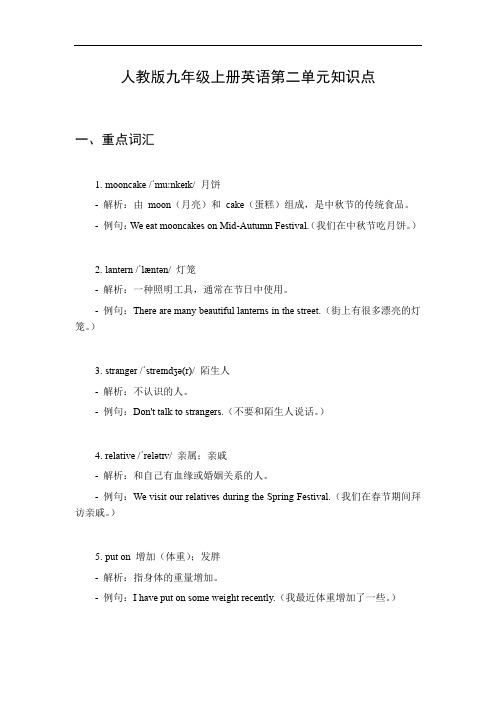
人教版九年级上册英语第二单元知识点一、重点词汇1.mooncake /ˈmuːnkeɪk/ 月饼-解析:由moon(月亮)和cake(蛋糕)组成,是中秋节的传统食品。
-例句:We eat mooncakes on Mid-Autumn Festival.(我们在中秋节吃月饼。
)ntern /ˈlæntən/ 灯笼-解析:一种照明工具,通常在节日中使用。
-例句:There are many beautiful lanterns in the street.(街上有很多漂亮的灯笼。
)3.stranger /ˈstreɪndʒə(r)/ 陌生人-解析:不认识的人。
-例句:Don't talk to strangers.(不要和陌生人说话。
)4.relative /ˈrelətɪv/ 亲属;亲戚-解析:和自己有血缘或婚姻关系的人。
-例句:We visit our relatives during the Spring Festival.(我们在春节期间拜访亲戚。
)5.put on 增加(体重);发胖-解析:指身体的重量增加。
-例句:I have put on some weight recently.(我最近体重增加了一些。
)y /leɪ/ 放置;安放;产(卵);下(蛋)-解析:过去式和过去分词分别为laid 和laid。
-例句:She laid the book on the table.(她把书放在桌子上。
)二、重点短语1.the Water Festival 泼水节-解析:一些国家和地区的传统节日,人们互相泼水表示祝福。
-例句:The Water Festival is very lively.(泼水节非常热闹。
)2.the Dragon Boat Festival 端午节-解析:中国的传统节日,有赛龙舟、吃粽子等习俗。
-例句:We eat zongzi on the Dragon Boat Festival.(我们在端午节吃粽子。
九年级英语上册第二单元重要知识点总结
Unit 2
一、知识点
1. used to 过去常常做某事,暗指现在已经不存在的动作或状态. 后跟动词原形. used to do sth.
There used to be ….(反意疑问句)didn’t there?
否定形式为: didn’t use to 或usedn’t to
疑问形式为: Did…use to…? 或Used…to…?
be/get used to doing sth.习惯于, to 为介词.
2. wear 表示状态. =be in +颜色的词
put on 表示动作.
dress + 人给某人穿衣服.dress sb. / oneself
have on表示状态(不用于进行时态)
3. on the swim team on 是…的成员,在…供职.
4. Don’t you remember me? 否定疑问句.(考点)
Yes, I do. 不, 我记得. No, I don’t 是的, 我不记得了.
5. 反意疑问句:
①陈述部分的主语为 this, that, 疑问部分
20 × 20。